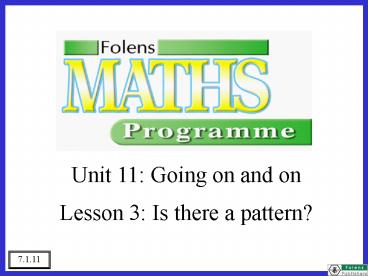Mathematics Year 9 - PowerPoint PPT Presentation
1 / 26
Title:
Mathematics Year 9
Description:
Lottery machines and random numbers on a calculator do not generate number sequences. ... Lottery numbers. 5, 17, 26, 32, 44, 47. 7.1.11. Terms in number machines ... – PowerPoint PPT presentation
Number of Views:41
Avg rating:3.0/5.0
Title: Mathematics Year 9
1
Unit 11 Going on and onLesson 3 Is there a
pattern?
2
The objectives of this lesson are
- to generate and describe simple integer sequences
- to generate terms of a simple sequence, given a
rule (e.g. finding a term from the previous term,
finding a term given its position in the sequence)
3
The objectives of this lesson are
- to generate sequences from practical contexts and
describe the general term in simple cases - to express simple functions in words, then using
symbols represent them in mappings.
4
Generate terms
What are the first five terms of sequences which
start with these numbers and with the
term-to-term rule shown in brackets?
7 (6)
7, 13, 19, 25, 31
8 (1)
8, 7, 6, 5, 4
100 (12)
100, 88, 76, 64, 52
37 (10)
37, 47, 57, 67, 77
5
Generate terms
What are the first five terms of sequences which
start with these numbers and with the
term-to-term rule shown in brackets?
0.4 (0.6)
0.4, 1.0, 1.6, 2.2, 2.8
6
Terms in number machines
The number 0 is fed into this 1 number machine.
The answer is then fed into the same machine.
If this continues, will a number pattern be
produced?
Yes
1
7
Terms in number machines
What will the sequence be?
1, 2, 3, 4,
1
1
1
1
1
2
3
4
8
Terms in number machines
What will the fifth term of this sequence be?
5
1
1
1
1
1
2
3
4
9
Terms in number machines
What will the nth term of this sequence be?
n
1
1
1
1
1
2
3
4
10
Terms in number machines
What will the last term of this sequence be?
There isnt one thesequence is infinite.
1
1
1
1
1
2
3
4
11
Terms in number machines
What are the numbers called in this sequence?
Consecutive numbers
1
1
1
1
1
2
3
4
12
Terms in number machines
What would happen if the function of the machine
were changed?
A different sequence of terms would be formed.
?
?
?
?
13
Terms in number machines
Who would like to change the starting number or
the function of the machine?
14
Terms in number machines
What has more effect changing the starting
number or changing the function of the number
machine?
15
Terms in number machines
Changing the starting number produces similar
sequences.
16
Terms in number machines
With a different function the sequences are not
alike.
17
Terms in number machines
18
Terms in number machines
Not all numbers generated by machines are
sequences. Lottery machines and random numbers on
a calculator do not generate number sequences.
19
Terms in number machines
Is this set of numbers a sequence? What is the
reason? If it is, is it finite or infinite?
Yes
1 added each time
Infinite
1, 2, 3, 4, 5, 6,
20
Terms in number machines
Is this set of numbers a sequence? What is the
reason? If it is, is it finite or infinite?
Yes
5 added each time
Infinite
5, 10, 15, 20,
21
Terms in number machines
Is this set of numbers a sequence? What is the
reason? If it is, is it finite or infinite?
Yes
10 subtracted each time
Finite
100, 90, 80, 70, 10, 0
22
Terms in number machines
Is this set of numbers a sequence? What is the
reason? If it is, is it finite or infinite?
Yes
1 subtracted each time
Infinite
3, 2, 1, 0, 1, 2,
23
Terms in number machines
Is this set of numbers a sequence? What is the
reason? If it is, is it finite or infinite?
No
Lottery numbers
5, 17, 26, 32, 44, 47
24
Terms in number machines
Is this set of numbers a sequence? What is the
reason? If it is, is it finite or infinite?
No
Tides are not regular
Tide table
25
Terms in number machines
Is this set of numbers a sequence? What is the
reason? If it is, is it finite or infinite?
Yes
2 added each time
Infinite
1, 3, 5, 7, 9,
26
Terms in number machines
Is this set of numbers a sequence? What is the
reason? If it is, is it finite or infinite?
No
There is no pattern
15, 30, 60, 90, 120































